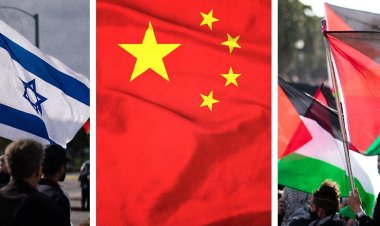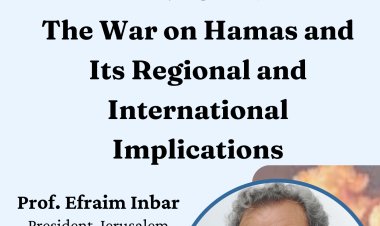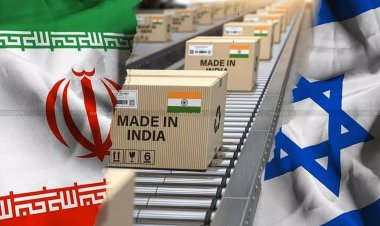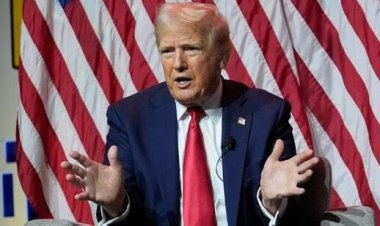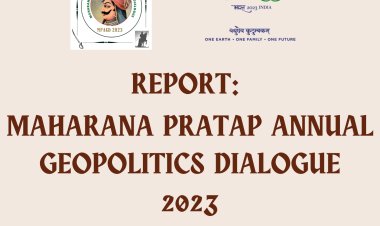Naftali Bennetts Israel: Future Trajectories and Foreign Policy Challenges (Part 2)
The following commentary looks at the potential challenges and the trajectory that Israel's foreign policy will face under the new Naftali Bennett government and how the government shall tackle these challenges and further existing diplomatic ties between Israel and its partners.
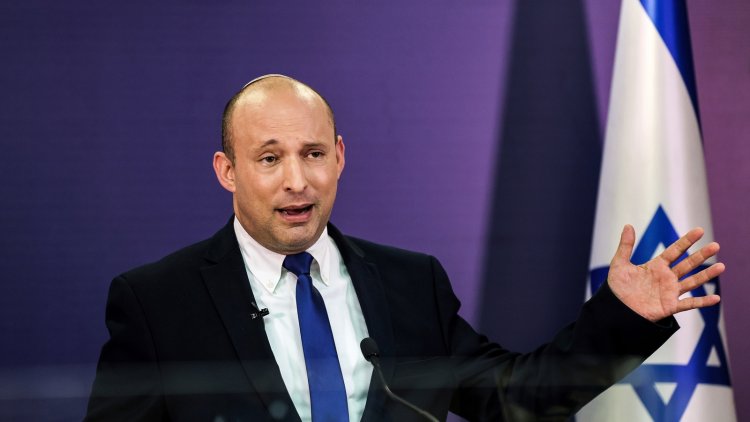
Commentary (Part two of a two-part series)
By Dr Anoop Kumar Gupta
This article is a part of a two-part series exploring the possible trajectory and challenges ahead of the new Israeli government under Naftali Bennett. Part 1 of the series can be accessed here.
Engagement with Regional Players
Israel’s pivot to Asia has been an important component of its foreign policy to boost its economy and expand its trade relations. The new government will focus on Asia, given its declining trade with Europe. India will remain its core strategic partner in South Asia. It will cement its multilateral ties with southeast Asian nations.
Israel will work hard to cement and expand the spirit of the Abraham Accords with US support to reduce its isolation and enhance its legitimacy in the Muslim world. Four Arab states that are UAE, Bahrain, Morocco, and Sudan have recently signed Abraham Accords with Israel to normalize their diplomatic relations with Israel. Though the Israel-Hamas conflict has emboldened the critics of normalization with Israel it proved to be a successful litmus test for that spirit. Egypt was the first Arab country to sign a peace treaty with Israel in 1979 followed by Jordan in 1994. Immediately after the end of the fourth Israel-Hamas conflict in May 2021, Joe Biden's administration is reportedly preparing the groundwork to encourage more Arab states to embrace the path of Abraham Accords.
Outlining the framework for Israel’s engagement with Middle Eastern states, Bennett stressed in his Knesset speech that his “government will work to establish and expand peace agreements with the Arab states, to increase regional economic, entrepreneurial, and cultural cooperation, and to deepen the direct connection between the peoples of the region, such as the connection between the citizens of Israel and the citizens of the United Arab Emirates.”
Bennett government will enhance its understanding with Saudi Arabia’s allies. Israel will also try to fix its strained relations with the Jordanian Hashemite Kingdom. Praising King Abdullah of Jordan, as an important strategic ally, Lapid pledged his new government would try to limit if not confront Iran and its proxies in the region.
The most challenging task for the Bennett government at the regional level would be to deal with Iran’s nuclear program and its linkages with non-state actors like Hezbollah and Hamas that are inimical to Israel. US President Donald Trump adopted a hawkish approach towards Iran and withdrew from the deal in 2018 which was concluded during the Barak Obama regime. But Biden administration is willing to engage Iran on the previous nuclear deal of 2015. During US Secretary of State Antony J. Blinken’s visit to Israel immediately after the Israel-Gaza conflict, PM Benjamin Netanyahu expressed his hope that the United States would not rejoin the 2015 Iran nuclear deal because “that deal paves the way for Iran to have an arsenal of nuclear weapons with international legitimacy.” Israel will keenly observe and prepare itself for the US diplomatic overture regarding Iran. However, US Secretary of State Antony Blinken during his Israel visit after the Israel-Hamas ceasefire at the end of May 2021 made it clear to Israeli Prime Minister Benjamin Netanyahu that the US will continue close consultation with Israel about any potential deal with Iran.
In an interview before the formation of the new government, Naftali Bennett stressing Israeli security concerns stated that we are not against the deal per se but asserted that we need effective monitoring, we need to cover the weaponization component along with the uranium enrichment component, and that Iran stops its international export of terrorism.
In his Knesset speech, Bennett again asserted that “Israel will not allow Iran to be equipped with nuclear weapons. Israel is not a party to the agreement, and will maintain full freedom to act.” He also stressed that “renewing the nuclear deal with Iran is a mistake that will once again lend legitimacy to one of the most discriminatory and violent regimes in the world.” Stressing Iranian threat to the region, Bennett said “Iran, through its Quds Force of the Revolutionary Guard, has established terrorist outposts – from Syria, through Gaza and Lebanon, and to Yemen.”
The new coalition government will not air its difference with the Biden administration on public platform regarding Iran nuclear deal renegotiation as former Prime Minister Netanyahu did during his dispensation. But the new dispensation under Naftali Bennett will try hard that if it could not stop the deal, then the new deal must restrict the Iranian nuclear program.
Dealing with the Palestinian question
Israel-United States-Palestinian triangle could witness that US-Israeli ties may feel a Palestinian element in the room under the Joe Biden administration. US-Palestinian engagement witnessed a very low profile under the Donald Trump administration. On the other hand, the US administration under Joe Biden asserted that it will try to rebuild its ties to and support the Palestinian people and leaders, after years of neglect. Joe Biden’s commitment to Palestinians indicates that it would demand Israel to agree to a negotiated peace with Palestinian Authority and freeze settlement activities in West Bank. Liberal Democrat members in the United States would also extend their support to Palestinians and will push the Biden administration to restrain Israeli actions. However, Palestinian Authority is not optimistic about the new Israeli government because it believes that the Bennett government will continue Netanyahu policies.
Looking at the diverse nature of the new coalitional government and the US administration’s priority in the Middle East, it will not be possible for the coalitional new government of Israel to follow a hawkish policy towards Palestinian territories. Prime Minister Naftali Bennett has been airing his voice against a two-state solution to the Israeli-Palestinian conflict. Right-wing secular leader of Yisrael Beytenu, Avigdor Lieberman is supportive of two-state solution but advocates population transfer. Right-wing New Hope leader Gideon Sa’ar is conservative towards Palestinians. Foreign Minister Yair Lapid of the centrist Yesh Atid party is a supporter of Independent Palestine. Left-wing partners of the new government, Labor and Meretz have been in favour of negotiated peace settlement with Palestinians. Islamist Arab Ra’am leader Mansour Abbas will expect a freeze on any further expansion of Jewish settlement in West Bank areas. In this conflicting background within the coalition, a new government will neither withdraw nor annex Palestinian territories. Coalitional compulsions may moderate the Bennett government’s policies towards the Palestinian issue.
Keeping that political diversity on the Palestinian issue in his mind, Bennett asserted before the formation of a new government that “my philosophy is to shrink the conflict. We won’t solve it, but where we can-more crossings, more (improvements to Palestinian) quality of life, more business- we will do.” Incoming Foreign Minister Lapid also stressed, “we might not be expecting a final status agreement soon but there is a lot we can do to improve the lives of the Palestinians and the dialogue with them on civil issues.”
Talking about violence and terrorism, Bennett asserted in his Knesset speech that “the Palestinians must take responsibility for their actions, and understand that violence will be met with a firm response.” Emphasizing the mutual benefit of peace, Bennett stressed that “security calm will lead to economic moves, which will lead to reducing friction and the conflict.
The new government will keep a hold on thorny issues such as West Bank annexation, Jewish settlement expansion, and eviction process in East Jerusalem and avoid escalation with Hamas ruled Gaza Strip. At the same time, it is not in a position to take any compromising initiative with Palestinians. That is why it seems safer for the new government to focus on conflict management and conflict reduction rather than conflict resolution. Both sides require a set of confidence-building measures to reduce the level of the current trust deficit to revive the moribund state of a bilateral negotiation.
New Bennett government needs to work with regional and global partners to ensure that reconstruction of the Gaza Strip after eleven days of fierce conflict will not become an instrument for rearming of Gaza-based terror groups like Hamas and Islamic Jihad. In his meeting with US Secretary of State Antony J. Blinken’s in May, 2021 former Israeli Foreign Minister Gabi Ashkenazi asserted stated that the rehabilitation of the Gaza Strip cannot occur without a joint mechanism for supervision and enforcement that will prevent the strengthening of the Hamas terrorist organization. Blinken also asserted that the US shall work with its partners “to ensure that Hamas does not benefit from the reconstruction assistance.” The new government will look forward to establishing such a mechanism with regional and global players that will monitor the reconstruction process in Gaza Strip. At the same time, the new government will not be enthusiastic to escalate the conflict with Hamas-led terror groups in Gaza but will not compromise on national security issues. That is why Bennett in his speech also expressed his hope that the ceasefire with Hamas is maintained but also warned that “if Hamas again chooses the path of violence against Israeli civilians, it will encounter a wall of iron.”
Conclusions:
Thus, the new coalition government shall focus its attention on domestic issues and will try to heal the mistrust that emerged after rioting in mixed cities in Israel during the Israel-Hamas conflict. The foreign policy of the new Bennett regime will focus on cementing relations with the United States along with other global players. At the regional level, the new regime will move forward to cement and expand Abraham's spirit to increase the circle of peace in its immediate and extended neighbourhood. It will also try to weaken terror groups in Gaza Strip and would be reluctant to take any substantive and concrete step regarding the complex peace issue with Palestinian Authority.
Dr Anoop Kumar Gupta has been visiting researcher at the Hebrew University of Jerusalem, Israel, and an alumnus of the School of International Studies, JNU New Delhi.
Disclaimer: This paper is the author’s scholarly contribution and does not necessarily reflect the organisation’s viewpoint.

